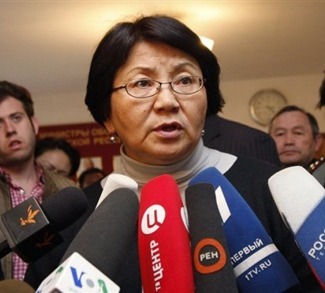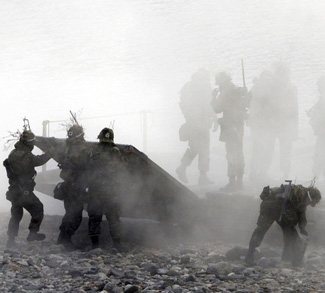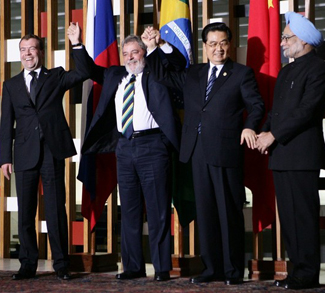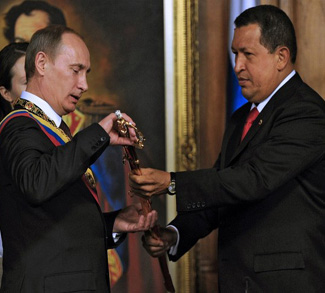FORECAST
Recent events in Kyrgyzstan have once again shone a spotlight on the politically fragile, though geopolitically crucial region of Central Asia.
On first glance, the situation unfolding in Kyrgyzstan bears all of the classic markers of a civil war in the making. The deposed President Kurmanbek Bakiyev has escaped violence in Bishkek to rally support for his cause in the south, while the new interim government is in a scramble to put state finances in order and consolidate support within the security forces. The rhetoric coming out of both camps betrays irreconcilable differences, and Bakiyev’s threats of bloodshed if the interim government launches an operation to capture him could prove prophetic in the future.
There are however two important factors mitigating against an immediate breakout of civil war in Kyrgyzstan.
The first is Bakiyev’s track record of corruption and misgovernment, which have robbed him of the popular support necessary to mount a serious challenge to the interim government over the short term. The second factor is the lack of any clear foreign patrons on each side of the conflict. While interim Kyrgyz leader Roza Otunbayeva’s comments that “Russia played [a] role in ousting Bakiyev” sparked a firestorm of speculation as to a possible Moscow connection in the coup, it’s unlikely that the United States or China will be willing to jump in on the side of Bakiyev.
This crisis comes at a key time insofar that the recent thaw in US-Russian relations may allow for a resolution that takes both major powers’ long-term interests into account. Moreover, Moscow views the NATO effort in Afghanistan as crucial to its campaign of reining in militancy in the North Caucuses- an issue that has once again come to the forefront in the wake of the Moscow bombings. Thus, any geopolitical maneuvering on Russia’s part is looking beyond short-term issues such as the Manas air base and instead aiming to re-assert the Russian sphere of influence in Central Asia over the long term.
Even without clear cut foreign patrons, it is still possible that this coup could trigger civil war in Kyrgyzstan. But such a conflict is far more likely to occur after the interim government’s ‘honeymoon period’ has expired and Kyrgyzstan’s economic problems persist; not over the course of the next few months.
As for the Manas air base- a hub that provides around twenty percent of NATO’s logistical support in Afghanistan– it will remain in American hands over the short term. The interim government has been ambivalent in its comments regarding the base so far, pledging to abide by the lease but also claiming that the agreement has gone missing. Regardless, the fact that the Manas lease is up in July means that this issue will be taking center stage in the coming months, whether the interim government can find it or not.
Even though Manas served as a focal point for Bakiyev’s corrupt dealings and continues to be unpopular with the Kyrgyz population, all of the major powers in the region have a stake in NATO success in Afghanistan. In the newly cordial atmosphere of US-Russian relations, it’s feasible that Washington could secure rights for the continued use of Manas’ facilities in exchange for guarantees for Moscow that the base won’t become a part of America’s long-term geopolitical strategy.
SUMMARY OF EVENTS: April 5th – April 12th, 2010
NORTH AMERICA
United States
President Barack Obama’s administration has unveiled a defence policy to significantly narrow the circumstances in which the US would use nuclear arms.
US President Barack Obama and his Russian counterpart, Dmitry Medvedev, have signed a landmark nuclear arms treaty in the Czech capital, Prague.
WESTERN EUROPE
Greece
European financial markets have been hit by renewed fears over the state of Greece’s debt-ridden economy.
Europe could lend debt-stricken Greece up to 30 billion euros (40 billion dollars) under a contingency package agreed on Sunday in a bid to restore investor confidence in the continent’s economy.
EASTERN EUROPE
Poland
Poles were in deep mourning on Sunday after President Lech Kaczynski and many of the country’s ruling elite were killed in a plane crash.
Russia
As President Obama prepares to sign a landmark arms control treaty with Russian President Dmitry Medvedev, a chorus of skeptics here is quietly expressing concerns that Moscow has conceded too much in the deal.
Russia may withdraw from the arms reduction treaty if Washington significantly increases its missile defense, Russian Foreign Minister Sergei Lavrov said on Tuesday.
MIDDLE EAST
Iran
Western authorities are investigating whether an Iranian firm acquired valves and vacuum gauges used to enrich uranium through the representative of a Chinese firm, the Wall Street Journal reported on Saturday.
The idea of international sanctions on Iranian oil exports is a joke, a senior Iranian official said on Tuesday, adding Iran would not abandon its disputed nuclear work despite mounting international pressure.
The UN ambassadors of six world powers are meeting in New York to discuss possible sanctions against Iran over its disputed nuclear programme.
Iraq
Six bombs rocked Baghdad killing at least 28 people on Tuesday, the second time the capital has come under attack in three days, fuelling fears insurgents are making a return due to a political impasse.
Classified U.S. military video showing a 2007 attack by Apache helicopters that killed a dozen people in Baghdad, including two Reuters news staff, was released on Monday by a group that promotes leaking to fight government and corporate corruption.
The former head of the UN’s chief nuclear agency, Mohammed ElBaradei, said in an interview with the British newspaper Guardian Wednesday that those who launched the war in Iraq were responsible for killing a million innocent people and could be held accountable under international law.
Iraq’s security forces were on high alert Monday after three suicide car bombs targeting regional and European embassies rocked Baghdad, killing 30 people.
SOUTH ASIA
Thailand
Tens of thousands of protesters converged on Bangkok’s shopping district on Saturday, forcing major retailers to close while accusing authorities of neglecting the poor on the 21st day of a mass rally seeking snap elections.
Tensions remained high on the bloodstained streets of Bangkok on Monday after the country’s worst political violence in almost two decades left 21 dead and over 800 injured.
Pakistan
Militants using a car bomb and firing weapons attacked the U.S. consulate in the Pakistani city of Peshawar on Monday hours after a suicide bomber killed 38 people elsewhere in the northwest, officials said.
CENTRAL ASIA
Kyrgyzstan
The government in Kyrgyzstan is struggling to retain power as deadly clashes escalate between police and thousands of protesters.
Kyrgyzstan’s President Kurmanbek Bakiyev, who was forced to flee the capital Bishkek amid a bloody uprising, has insisted he will not resign.
Kyrgyzstan’s interim government warned Sunday it could use force against ousted President Kurmanbek Bakiyev, raising tensions in the Central Asian state vital to US operations in Afghanistan.
EAST ASIA
North Korea
North Korea has denied involvement in the sinking of a South Korean navy ship that broke in half after an explosion last month, leaving 44 sailors still missing, a newspaper reported on Saturday.
China
China said Wednesday it hoped the upcoming BRIC countries (Brazil, Russia, India and China) summit would push for international financial reform.
The US has again stressed its desire to persuade China to allow its currency, the yuan, to trade more flexibly on foreign exchange markets.
AFRICA
Sudan
The European Union has withdrawn its election observers from Sudan’s Darfur region, citing safety considerations.
South Sudan’s main party has said it will boycott this week’s elections in most of northern Sudan, citing voting irregularities and security fears.
Somalia
Heavy clashes have broken out between two rival militant groups in central Somalia, leaving at least 17 people dead and 20 injured.
Somali pirates seized a South Korean- flagged oil tanker about 1,200 nautical miles to the east of the world’s most dangerous waters of Somalia, Yemeni Interior Ministry Monday quoted a communique of the Embassy of South Korea in Sanaa as saying.
Al-Shabab an armed rival Islamist faction in Somalia has on early Tuesday morning taken control of Mataban district at Hiran region in central Somalia.
Al-Shabab has taken control of the United Nations mission in southern Somalia, reports said Thursday.




